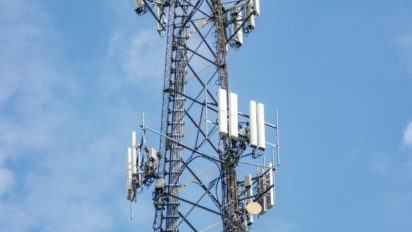It’s 2022 — we have roll-up TVs, foldable smartphones, voice-activated assistants, a plethora of internet-connected smart devices and more technology being introduced every day. And with more smart devices comes the need for a better-connected network.
In 2019, we were promised more 5G technology as wireless and internet service providers launched the technology across their networks.
So, what exactly is 5G, who’s currently implementing it, how does it differ from previous technologies and how could it benefit you? Here’s what you can expect from 5G technology in the coming years:
On this page:
- What is 5G?
- What companies offer 5G already?
- The benefits of 5G
- Hurdles to implementing 5G technology
- What 5G can do for you
What is 5G?
Fifth-generation cellular wireless, or 5G, refers to a form of mobile communication and the technical ground rules that outline how that network operates.
The technology is an evolution of the 4G or 4G LTE wireless data you may currently use with your existing smartphone or devices. These 5G networks are powered by a new technology referred to as millimeter wave, or mmWave.
How is 5G different from 4G?
This latest evolution focuses on massive device connectivity with reduced latency — in other words, how quickly data transfers between a source and its destination — and a higher data rate. Where 5G outperforms current technology is its speed and connectivity. In a live demonstration of a prototype 5G device on a prototype 5G network by Qualcomm, Motorola and Verizon, the test modem was able to transfer a gigabyte worth of data in just 17 seconds.
How fast is that in a real-world scenario? To put these speeds in perspective, according to the Consumer Technology Association, on a 5G network, you could download a two-hour movie in 3.6 seconds compared to 6 minutes on a 4G network or 26 hours on a 3G network.
Time to download a 2-hour movie on 5G vs. 4G vs. 3G networks
| 5G network | 4G network | 3G network |
|---|---|---|
| 3.6 seconds | 6 minutes | 26 hours |
What companies offer 5G already?
In 2019, we saw a number of providers begin to take advantage of 5G technology.
- Verizon was the first to begin rolling out 5G fixed broadband service in Houston, Indianapolis, Los Angeles and Sacramento in October 2018. Unlike the 4G technology you connect to on your phone, Verizon 5G Home Internet isn’t mobile. Instead, it’s a fixed service that connects your home with ultra-fast speeds, typically 300 Mbps but ranging up to 940 Mbps.
- In late December 2018, AT&T launched its mobile 5G network in 12 cities across the U.S., including Atlanta, Charlotte, Houston, Jacksonville, Louisville, Oklahoma City, New Orleans and San Antonio. AT&T’s 5G network more closely resembles a traditional mobile wireless network.
- T-Mobile launched its nationwide 5G network in December 2019, making it the “country’s biggest 5G network, covering more than 1 million square miles, much of that in rural America.“ However, T-Mobile mainly relies on “low-band wireless spectrum, versus the high-band spectrum that AT&T and Verizon are using” according to CNN Business. This means that though they are providing 5G access to a larger number of people, the service will overall be slower than that of their rivals.
5G in 2020 and beyond
“With a minimal expansion of their network resources, many operators will start to offer ‘5G’ branded services and consumers can expect some moderately improved services when close to the new base stations,” said Ampalavanapillai Nirmalathas, professor of electrical and electronic engineering at the University of Melbourne and director of the Networked Society Institute.
“However, the real promise of the 5G dream will only be realized when we can drive the value creation through new and interesting applications (many yet to be conceived and developed) as well as much development that needs to happen to bring down the cost of 5G technologies. The dream network of 5G will take shape probably in 2021 onwards.”
Long story short, though strides are being made, the true 5G revolution is still ahead of us.
The benefits of 5G
Aside from speed and connectivity, 5G networks have the potential to completely revolutionize the way we operate. Nirmalathas compares the arrival of 5G technology to that of the arrival of the World Wide Web or laptops and the impact they had on our lives.
From this perspective, 5G technology can:
- Allow businesses to use mobile platforms to automate their production and logistics.
- Enable users to interact with applications using augmented or virtual reality in a time-sensitive way.
- Integrate seamlessly with platforms and systems using a mobile network.
Industry expert Dr. Amitabha (Amitava) Ghosh, Nokia Fellow and Head of the Radio Interface Group at the Nokia Bell Labs elaborated, “New uses will arise, many not yet conceived . . . The way we travel, how we can control remote environments, how the infrastructure around us can support us, and how we produce goods will completely change.”
According to Ghosh, every industry will be affected by 5G. With network speeds as high as 10 Gbps and extremely low latency, 5G technology will be the platform for enabling growth in industries ranging from information technology to automobile, entertainment, agriculture and manufacturing.
Augmented reality will offer new experiences and ways to enhance traditional everyday transactions. Even simple tasks that today may take a lot of time or data, such as using your smartphone in a packed venue, stadium or airport, will take less time.
As with any new technology, though, Nirmalathas cautions that 5G technology should not just be limited to urban hotspots or in-home devices. “It needs to be everywhere to realize such a dream of a pervasive 5G and its potential impact,” Nirmalathas said. “This is where the problems and risks of this technology start.”
Hurdles to implementing 5G technology
Despite all the advancements being made in the world of 5G, it’s still a relatively new technology with a number of implementation hurdles. Take a look at the top three things standing in the way of a faster and further-reaching 5G rollout.
- Infrastructure — Because many existing mobile networks rely on lower frequencies, a 5G network would need to be built on a higher frequency. But higher frequencies don’t transmit as well in areas with many buildings or trees. To solve for this, providers are having to build a number of new 5G base stations very close to consumers.
- Cost — Because of the cost to update, build and manage these new base stations and networks as well as connect homes and workplaces to the network, there could be a high cost of implementation associated with 5G technology making access a possible “luxury” at first. Not to mention the added cost of purchasing a new 5G-capable smartphone. T-Mobile is somewhat combatting that reality by making low-cost 5G technology widely available, though as mentioned earlier, it’s not the same standard of 5G that other companies are deploying.
- Time — In addition to base stations, 5G dense deployments require other supporting infrastructure updates, including fiber connections and possibly new technologies like Integrated Access and Backhaul (a technology that would improve coverage and capacity), which would also take time to implement.
What 5G can do for you
So, as an everyday consumer, you may be wondering: “Why should I care about 5G?”
In short: speed and connectivity.
As more and more users rely on mobile phones as their main way to connect to the world instead of desktop or laptop computers, a better-connected network with increased speed and reduced latency can be our gateway to any number of applications.
Consumers can also expect highly personalized and customized products delivered to them wherever and whenever they need them in shorter periods of time.
Think of applications such as:
- VR and AR to try on clothes or redecorate your home.
- 3D printers creating goods instantly.
- Stores predicting and adapting to your preferences.
Or, cities that invest in smart infrastructure may be able to provide useful services such as:
- Monitoring and preventing pollution.
- Upgrading traffic systems to reduce road congestion.
- Improving video security camera systems for public safety.
According to Nirmalathas, 5G technology will offer more power to our mobile devices, especially considering they are always connected to the “pervasive internet” in the form of new bandwidth, the speed of response and new modes of using our devices.
“We already spend more time on our mobile devices. If the connectivity can be a bit more seamless, coverage much better and bandwidth can be really good, consumers will gain a lot of advantages.”
Keep tabs on emerging 5G, broadband news and more by checking back to the Resource Center and signing up for our weekly newsletter.
Written by:
Lisa IscrupeWriter, Broadband & Data Content
Lisa uses years of experience in sales and customer service for internet-TV providers to inform her writing on broadband. Her work has been referenced by CNN and other national sources.
In Lisa’s Words: Ever…
Read more
Edited by:
Trey PaulEditor, Broadband Content
-
Featured
![5G is the key to making more cities ‘smart’]() 5G is the key to making more cities ‘smart’ Ari Howard — 4 min read
5G is the key to making more cities ‘smart’ Ari Howard — 4 min read -
Featured
![DISH’s purchase of Boost Mobile puts it one step closer to its 5G dreams]() DISH’s purchase of Boost Mobile puts it one step closer to its 5G dreams Joe Supan — 4 min read
DISH’s purchase of Boost Mobile puts it one step closer to its 5G dreams Joe Supan — 4 min read -
Featured
![30% of Americans say their internet is too slow. Here’s how to fix it]() 30% of Americans say their internet is too slow. Here’s how to fix it Joe Supan — 4 min read
30% of Americans say their internet is too slow. Here’s how to fix it Joe Supan — 4 min read
Latest
-
Wednesday, April 24, 2024
Why do you need an Optical Terminal Network?Taylor Gadsden — 2 min read
-
Tuesday, April 23, 2024
Worried about losing your TV signal? This is how to keep your satellite dish cleanDavid Anders — 6 min read
-
Tuesday, April 23, 2024
How to change your Wi-Fi network passwordCamryn Smith — 2 min read





